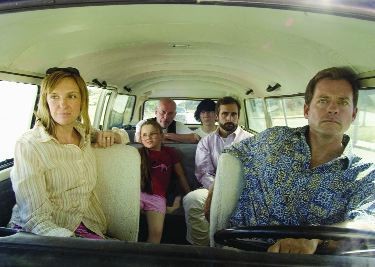Unrehearsed

The first act of the satirical comedy Little Miss Sunshine has an affable scattershot loopiness. Frank (Steve Carell), an English professor hospitalized after a suicide attempt (he broke down upon losing his male grad-student lover to an academic rival), is released into the hands of his sister, Sheryl (Toni Collette). Sheryl is married to Richard (Greg Kinnear), a motivational speaker in Albuquerque who presses his program for success onto his children—a teenage boy, Dwayne (Paul Dano), and a little girl, Olive (Abigail Breslin)—even though his method doesn’t seem to be helping him to land a book contract.
Sheryl’s patience for her husband’s relentlessly upbeat patter is wearing thin. Dwayne has already opted out: he’s biding his time until he’s old enough to get into flight school; in the meantime he’s taken a vow of silence, to minimize his interaction with his parents.
Only Olive still takes her dad’s exhortations to heart. She’s entered a children’s talent competition, the winner of which will be crowned Little Miss Sunshine. When she makes the cut, the whole family—including Richard’s dad (Alan Arkin)— piles into a crippled VW bus and heads for L.A. They encounter a variety of obstacles on the way, such as Grandpa’s expiring quietly in the back of the vehicle.
As directed by Jonathan Dayton and Valerie Faris, the messiness of the family dynamic is generally so uproarious in the Albuquerque scenes, and so well acted, that you don’t mind the bits that fall flat (like the entire subplot involving Arkin’s character) or the sloppiness of the narrative (like the fact that Dwayne’s aspiration to be a pilot and his vow of silence don’t seem to belong to the same personality). But once the family takes to the road, the hilarity becomes more hit-and-miss, and Michael Arndt’s script keeps slipping into the sentimentality that often lurks beneath movies about quirky dysfunctional families—even movies, like this one, that present themselves as acerbic and alternative.
Still, Dayton and Faris’s actors keep coming through for them. Talented young Breslin displays a sweet little-engine-that-could persistence. Dano finds fresh, funny ways to convey a teenager’s exasperation with the incomprehensible adult world. Carell, star of TV’s The Office and of last year’s hit farce The 40-Year-Old Virgin, applies his astounding comedic precision to his first character role and turns out to be a terrific straight actor. The always-reliable Collette gives Sheryl a touchingly rumpled, sad-sack quality balanced by a tart sanity. And Kinnear is amazing as a man so tensely defined by his commitment to success that when it eludes him, his whole body knots up and his attention roams compulsively, as if he were searching for a signal to hook up to. He’s so desperately concentrated that even his eyes appear to sweat.
The L.A. section is intended to send up talent contests in the manner of bright small-time comedies like Smile (1975) and Drop Dead Gorgeous (1999). But something goes peculiarly wrong in this final act. Implausibly, no one in the family has actually seen Olive’s number except her grandfather, who coached her, so they’re all startled when she starts bumping and grinding to a disco tune. The other parents are shocked, as is the snotty organizer (Beth Grant). In a unanimous gesture of support, the family not only cheers Olive on but gets into the act, boogying alongside her. We’re supposed to see that they’re making the best of a terrible situation and that their love for their earnest, hopeful little girl—who is out of her league in the company of child performers who have been rehearsed to within an inch of their lives—is providing a point of familial solidarity.
The problem is that Olive’s number is asked to do double duty: we’re also supposed to think that the other adults in the room are hypocrites and that the kitschy acts that preceded Olive’s number are just as shamelessly solicitous. There’s something slightly queasy-making about the way the filmmakers use a little girl’s striptease to expose the other contestants’ desperate bid for approval. It is a glaring example of the film’s failure to work through a comic idea and of why Little Miss Sunshine, for all its acting smarts and occasional wit, is a disappointment.





